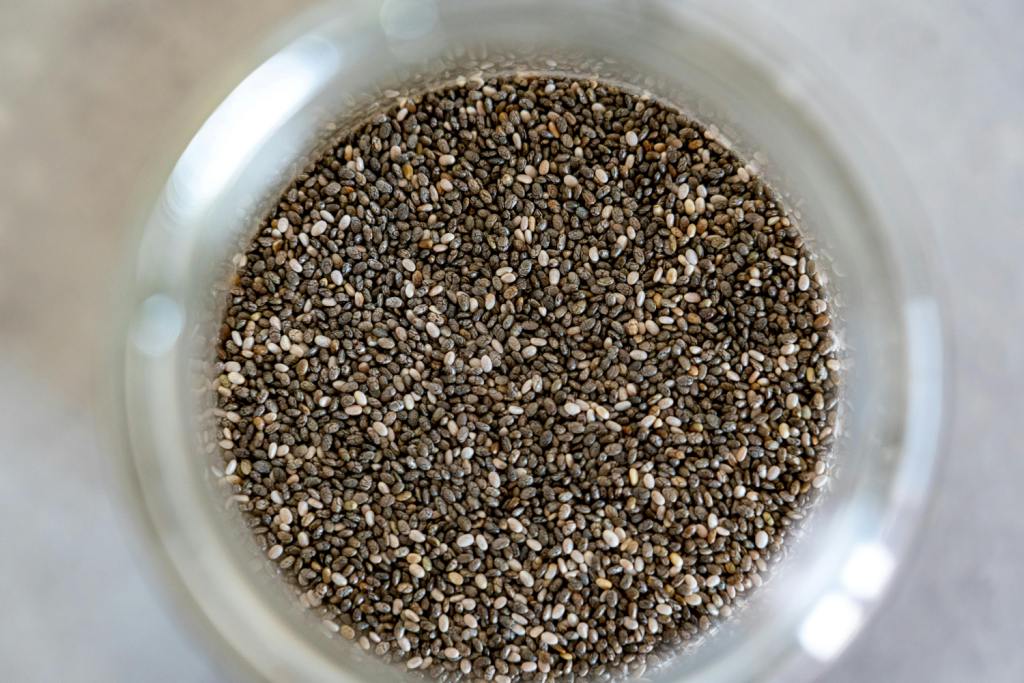Omega 3 on a Vegan Diet

Omega-3 fatty acids are essential nutrients that play crucial roles in supporting overall health and well-being. These polyunsaturated fats are considered "essential" because the body cannot produce them on its own and must obtain them through dietary sources.
Omega-3 fatty acids are well-known for their numerous health benefits, including supporting heart health, brain function, and reducing inflammation.
What types exist?
Alpha-Linolenic Acid (ALA): ALA is a plant-based omega-3 fatty acid found in various plant oils, seeds, and nuts. It serves as a precursor for the synthesis of other omega-3 fatty acids in the body and is considered essential for health.
Eicosapentaenoic Acid (EPA): EPA is primarily found in fatty fish and seafood and is known for its anti-inflammatory properties. It plays a crucial role in cardiovascular health, immune function, and mood regulation.
Docosahexaenoic Acid (DHA): DHA is another omega-3 fatty acid found primarily in fatty fish and seafood. It is essential for brain development and function, eye health, and maintaining the integrity of cell membranes.
Omega-3 fatty acids, specifically EPA and DHA, are primarily synthesized by marine algae, which are consumed by small fish and other marine organisms.
These small fish, such as anchovies, sardines, and mackerel, accumulate EPA and DHA in their tissues through their diet of algae.
As larger predatory fish consume these smaller fish, they also accumulate EPA and DHA in their tissues, albeit in higher concentrations due to their position higher in the marine food chain.
Additionally, certain species of fatty fish, such as salmon, trout, and tuna, have the ability to convert ALA, obtained from their diet of algae or other marine organisms, into EPA and DHA in their bodies.
This conversion process allows these fatty fish to accumulate significant levels of EPA and DHA, making them rich sources of these omega-3 fatty acids.


Benefits of Omega-3 Fatty Acids:
Omega-3 fatty acids offer a wide range of health benefits, including:
1. Heart Health: Omega-3 fatty acids have been shown to reduce the risk of heart disease by lowering triglyceride levels, reducing inflammation, improving blood vessel function, and lowering blood pressure. Regular consumption of omega-3-rich foods or supplements may help lower the risk of heart attacks, strokes, and other cardiovascular events.
2. Brain Function: DHA, in particular, is essential for brain development and function. It is a major component of brain cell membranes and plays a crucial role in cognitive function, memory, and mood regulation. Adequate intake of omega-3 fatty acids during pregnancy and early childhood is important for optimal brain development and cognitive function.
3. Eye Health: DHA is also abundant in the retina of the eye and is essential for maintaining healthy vision. Adequate intake of omega-3 fatty acids may help reduce the risk of age-related macular degeneration and other eye conditions that can lead to vision loss.
4. Inflammation Reduction: EPA and DHA have potent anti-inflammatory properties that can help reduce inflammation throughout the body. Chronic inflammation is linked to various chronic diseases, including heart disease, arthritis, and autoimmune disorders. Consuming omega-3-rich foods or supplements may help reduce inflammation and alleviate symptoms associated with inflammatory conditions.
5. Mood Regulation: Omega-3 fatty acids, particularly EPA, have been studied for their potential antidepressant effects. Some research suggests that omega-3 supplementation may help improve mood and reduce symptoms of depression and anxiety. Omega-3 fatty acids are thought to support brain health and neurotransmitter function, which can influence mood regulation.
6. Joint Health: Omega-3 fatty acids have been shown to have beneficial effects on joint health, particularly in individuals with rheumatoid arthritis and other inflammatory joint conditions. EPA and DHA may help reduce joint pain, stiffness, and swelling, improving overall joint function and mobility.

How to Get Omega-3 Fatty Acids as a Vegan:
For individuals following a vegan lifestyle, obtaining omega-3 fatty acids can be achieved through plant-based sources. While fish and seafood are the most concentrated sources of EPA and DHA, there are several plant-based foods that provide alpha-linolenic acid (ALA), which can be converted into EPA and DHA in the body.
Here are some vegan-friendly sources of omega-3 fatty acids:
1. Flaxseeds and Flaxseed Oil: Flaxseeds are one of the richest plant sources of ALA, the precursor to EPA and DHA. Grinding flaxseeds or using flaxseed oil in dressings, smoothies, or baked goods can provide a concentrated source of ALA.
Amount of ALA: about 1.8 grams of ALA per tablespoon.
2. Chia Seeds: Chia seeds are another excellent source of ALA and can be easily incorporated into various dishes, such as oatmeal, yogurt, salads, and puddings. They also provide fiber, protein, and other essential nutrients.
Amount of ALA: they contain roughly 1.6 grams of ALA per tablespoon.
3. Hemp Seeds and Hempseed Oil: Hemp seeds and hempseed oil are rich in ALA and offer a nutty flavor that complements a variety of dishes. Sprinkle hemp seeds on salads, yogurt, or oatmeal, or use hempseed oil in salad dressings and dips.
Amount of ALA: about 2.5 grams of ALA per tablespoon of seeds or oil.
4. Walnuts: Walnuts are one of the few nuts that contain ALA, making them a convenient snack option for vegans seeking omega-3 fatty acids. Enjoy walnuts as a snack on their own or add them to salads, oatmeal, or baked goods.
Amount of ALA: contain approximately 2.5 grams of ALA per ounce.
5. Algal Oil Supplements: Algal oil is derived from algae and is a vegan-friendly source of EPA and DHA. Algal oil supplements provide a direct source of these essential fatty acids without the need for fish or seafood. Look for algal oil supplements that provide both EPA and DHA for optimal health benefits.
6. Leafy Greens: While not as rich in omega-3 fatty acids as other sources, leafy greens like spinach, kale, and Brussels sprouts contain small amounts of ALA. Including a variety of leafy greens in your diet can contribute to your overall omega-3 intake.
Recommended Intake of Omega-3 Fatty Acids:
The recommended intake of omega-3 fatty acids can vary depending on factors such as age, sex, health status, and dietary preferences. Here are the general guidelines for omega-3 intake:
1. ALA: The Adequate Intake (AI) for ALA is 1.6 grams per day for men and 1.1 grams per day for women. Pregnant and lactating women may have higher ALA requirements to support fetal development and breastfeeding.
2. EPA and DHA: While there is no specific recommended intake for EPA and DHA, many health organizations recommend consuming at least 250-500 milligrams of combined EPA and DHA per day for general health maintenance. Higher doses may be recommended for individuals with specific health conditions or risk factors.
3. Ratio of Omega-6 to Omega-3 Fatty Acids: It's also important to consider the ratio of omega-6 to omega-3 fatty acids in the diet, as an imbalance between these fatty acids can contribute to inflammation and chronic disease risk. Health experts generally recommend maintaining a ratio of omega-6 to omega-3 fatty acids between 1:1 and 4:1 for optimal health.

Symptoms of Omega-3 Deficiency:
Omega-3 fatty acid deficiency is relatively rare in developed countries but can occur in individuals with inadequate dietary intake or absorption issues. Some common symptoms of omega-3 deficiency may include:
1. Dry, Flaky Skin: Omega-3 fatty acids help maintain skin hydration and integrity. Deficiency may lead to dry, flaky skin, and an increased risk of skin conditions like eczema and dermatitis.
2. Joint Pain and Stiffness: Omega-3 fatty acids have anti-inflammatory properties that can help reduce joint inflammation and pain. Deficiency may exacerbate symptoms of arthritis and other inflammatory joint conditions.
3. Fatigue and Poor Concentration: Omega-3 fatty acids are essential for brain function and cognitive health. Deficiency may lead to symptoms such as fatigue, poor concentration, memory problems, and brain fog.
4. Mood Changes: Omega-3 fatty acids play a role in mood regulation and neurotransmitter function. Deficiency may contribute to symptoms of depression, anxiety, irritability, and mood swings.
5. Heart Health Issues: Omega-3 fatty acids are important for heart health and may help reduce the risk of heart disease. Deficiency may lead to elevated triglyceride levels, high blood pressure, and an increased risk of cardiovascular events.
Omega-3 fatty acids are essential nutrients that play critical roles in supporting heart health, brain function, joint health, and overall well-being. Vegans can obtain omega-3 fatty acids from plant-based sources like flaxseeds, chia seeds, hemp seeds, walnuts, and algal oil supplements.
Regular monitoring of omega-3 status and consulting with a healthcare professional or registered dietitian can help optimize omega-3 intake and support optimal health and vitality.









